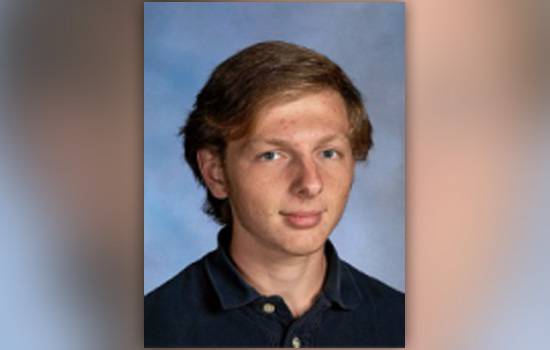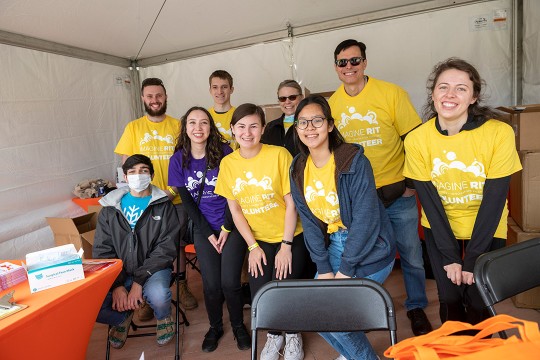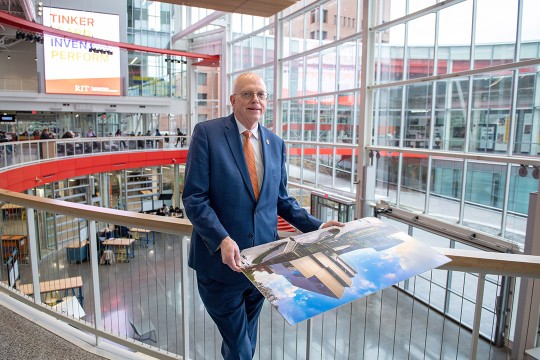Freshman represents U.S. in physics tournament
Student SpotlightJohn Lukowski, first-year electrical engineering
Provided
John Lukowski, a first-year electrical engineering student, served as captain for the U.S. team in the International Young Physicists’ Tournament this summer.
John Lukowski, a first-year electrical engineering major, competed in the International Young Physicists’ Tournament in Thailand over the summer. Lukowski’s team presented solutions to nearly 20 physics problems and placed 23rd in the weeklong tournament. The Phoenixville, Pa., native is also involved with several RIT clubs including the juggling, running, cycling, triathlon and rock climbing clubs.
Question: What brought you to RIT?
Answer: I came to RIT because of the excellent electrical engineering program offered here.
Q: What is the International Youth Physicists’ Tournament.
A: It is a tournament in which youth from around the world share their insights, research and projects for 17 different physics problems that have very little prior research.
Q: How were you selected to compete in the tournament?
A: My physics teacher was invited to start a team for the U.S. so he asked a couple of the schools in our area to participate. We held a national selection tournament in March and a panel of judges including physics professors from the University of Sciences in Philadelphia and prior tournament judges selected students with the highest scores to join the team. I was selected as one of the five team members to go.
Q: What was your research on?
A: I researched the moving brush problem, two balloons problem, singing blades of grass problem and magnetic pendulum problem. I spent over two months running experiments for the projects. I had to research magnetic dipole moments, simple and complex oscillators and Doubochinski's Pendulum. I also had to research the Euler Bernoulli beam equations, base excitation, and vibrations of a membrane. I ended up creating my own equations to model each project, and I wrote programs in Python and MATLAB to model the projects. Throughout the project process we were all helped by the physics professors from the University of Sciences in Philadelphia and by our physics teacher.
Q: How is the tournament run?
A: The tournament is run a very specific way. There are three teams competing at a time, which is called a fight. The three teams are the reporter team, opponent team and review team. Basically the reporter team accepts a challenge and presents their solution, the opponent team picks out the strengths and weaknesses of the presenter’s solution and the review team figures out what was missed by the opponent and gives an overview of the round.
Q: What were your responsibilities as team captain?
A: As team captain, I represented the team at the formal events and I accepted challenges from the other teams. I also coordinated the team during the fights.
Q: How were you judged?
A: The panel of judges will give a score for each participant from 1 to 10 and those numbers are appended to the team score. The presenter gets three times their average score, the opponent gets two times their average score and the review just gets their average score. After one fight, the teams rotate positions and continue fighting until every team has a turn in all of the three positions. Next, the teams move to another round with different teams. At the end, the three teams with the highest scores move on to the finals.
Q: How many teams did you compete against?
A: We competed with 26 other teams and were the only U.S. team. The U.S. hasn’t participated in the tournament in the last eight years.
Q: Where did you place in the tournament?
A: We placed 23rd but we were very close to getting 20 or 21st place. According to the other teams and judges at the competition, we were one of the best first-year teams to compete.
Q: As a first-year student, what are some of your goals?
A: As a first-year student, I hope to make it into the BS/MS program for electrical engineering.
Traci Turner compiles “Student Spotlight” for University News. Contact her at trt6538@rit.edu with suggestions.















